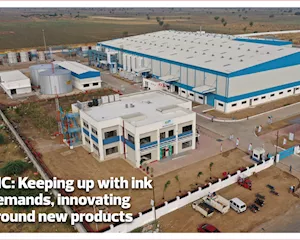Bimal Mehta, executive director at Vakil & Sons and Vakils Premedia says, “The communication industry is changing, which is affecting the printers world over and India is no exception. Unfortunately, our ink and paper focussed industry does not talk about the changing times but our consumers are clearly looking at other alternatives.”
Today, the way a book is ‘produced, delivered and consumed’ is getting transformed. In the education segment, with the tablet prices dropping, a shift from the conventional books to a more interactive platform is been encouraged.
“The e- publishing segment has the potential to integrate pre-print, printing and fulfilment under one roof. With investments at varied functionalities, the publishers can ensure the content is attainable in both, the print and the digitised format,” says Vinutha Mallya of LineSpace Consulting, the Bengaluru-based consulting service provider.
The Indian players seem to have decrypted this space and leveraged their competitiveness over their overseas counterparts adhering to their proficient pre-print services. Aptara, Cenveo Publishing Services, Datamatics Global Services, Integra, Repro India, Thomson Digital, Vakil & Sons / Vakils Premedia are a few firms to have forayed into the e-publishing segment and how!
Headquartered in Falls Church, Virginia, Aptara boasts of a clientele including Applied Medical, Cambridge University Press, Grupo Planeta, McGrawHill, Pearson, R R Donnelley, Random House, The Penguin Group, Wiley-Blackwell and the likes. Meanwhile Cenevo Publishing Services, through its e-publishing arm – Cadmus Communications, provides e-editing and distribution services to its clients; Repro India, with a total of about 500 publishers under its belt, claims to deliver digitised titles within 48 to 72 hours through its Web Store Front.
These firms are future-ready and their strategy is simple, e-dapt.
One size that fits
Like its print contemporary, e-publishing has content management at its heart. “Printing is not the core activity of the publisher. The publisher has his own struggles with content management, inventory and obsolescence costs,” says Pramod Khera, executive director at Repro India.
The pivotal concern for an e-publisher is to create content that is flexible, portable, reusable, obsolescence proof and most importantly, neutral to leverage their competitiveness. The strategy is to be able to cater to a dual set of audience - one that continues to favour print and one that prefers the click-way.
The large players in the segment have responded quickly to optimise their financials and sustained the slowdown to maintain healthy margins, promising a stronger hold in the next growth phase. On the flip side, the medium-sized firms need to act now to be able to survive the economic crisis.
Reality check
The results of the fourth e-Book Survey of Publishers, released in April, 2012, presents a mixed portrait of the e-publishing segment. A trend to turn to a third party content technology partner has been on the rise (about 54%) among the e-publishing aspirants.
According to the survey results, there is a 30% increase in the number of e-publishers in the last three years; four out of five publishers, now produce e-books. A majority of the publishers produce more than 50% of their titles as e-Books. A step ahead, 31% of e-Book publishers produce enhanced e-Books, a 24% increase in just one year.
In India, the number of publishers adopting the e-way has quadrupled. The result reveals a decline in the consumption of e-books over the past two years but strongly affirms the e-book production and the revenues to be on the rise - 36% of e-Book publishers are realising double-digit annual e-Book revenues, a 100% increase (in publishers) since the last year’s survey.
Outsourced publishing: An opportunity
The outsourced publishing business in India constitutes 30% of the nation’s annual growth figures. Today, the Indian publishers have a lot more to offer on the platter than mere PDFs of a book.
In a research conducted by ValueNotes, a market intelligence and consulting firm, India has surfaced as the preferred destination for publishing outsourcing, Among the 237 publishers, consultants and service providers who were surveyed, largely from the US and UK, 66% of the respondents rooted for India, followed by the US with 30%, the Phillippines 18%, UK and China 16%, Vietnam 8% and Australia 5%, with the remaining 18% in favour of other upcoming destinations.
Conclusion
The picture looks beauteous: e-publishing soaring, some Indian publishers are at the helm, others are adopting digitisation, international publishers are investing resources and trust in the Indian players, newer revenue models, but the moot question is, are we ready yet?
These top publishing houses are growing in stature and expanding their operations across the globe through both, organic and inorganic growth. The major publishing houses are acquiring the medium-sized firms to relegate the digitisation process, while maintaining their strong print foothold.
“The schedules and volumes of printed and e-books will get intricately mixed, depending on the market demand and the choice on sequencing of publisher,” says Rajnish Karki, Karki & Associates. He adds, “In the education segment, with a possible faster and higher proportion of switch to e-books – once government(s) make-up their mind, the ‘integrated solution’ will not only be viable but superior for publishers. They will be better placed to manage and optimise on the volumes and schedules, along products (printed and e-books, in ratios ranging from 70 to 30%), operations (web, sheet-fed, POD, electronic) and fulfilment methods.”
The concept of e-learning is far from picking up in India in the next five years, at the least. “I don’t see a major trend shifting to e-Books as yet. Till the next decade, there won’t be much impact of e-Books on the Indian printing industry. However, if the educational school books market switches to e-Books, the scenario will change drastically,” says Apurv Garg of Brijbasi Art Press.
But as predictable as e-learning seems, PrintWeek India’s list of the who’s who!
The service providers – At a glance
Aptara
Headqaurtered in Virginia, the leading content solution provider has established operations in New Delhi, Pune, Dehradun and Trivandrum in Kerala for e-book conversion and publishing. With an onshore / offshore team of 5,600 professionals, the firm deploys solution for multi-channel publishing of books, journals, educational, and corporate content through both traditional and new digital distribution channels. The firm’s end-to-end web-based technology, PXE, claims to reduce the turnaround time for producing multichannel content by 75%. In October 2012, Aptara bagged six Brandon Hall ‘Excellence in Learning’ awards.
Cenevo Publisher Services
With three facilities in U.S. and five in India, the company provides services to major k-12, higher-ed and STM publishers. The $ 2 billion company introduced their custom workflow – MobiledPub, a ‘device-neutral, browser-based e-reader’. This, says Atul Goel, senior v-p of global operations and technology, facilitates the publisher to move towards a single-source solution.
Datamatics Global Services
Unshackling from being a traditional pre-press house to being an end-to-end service provider, Datamatics has continually expanded its reach and capabilities through organic and inorganic growth. The Devoteam Dantem acquisition and the joint venture with Cignex has enabled the service provider enhance its capacity and capabilities manifold in the e-publishing segment. A majority of the firm’s clients are from the reference and textbook segments with 85% in the US.
DiacriTech
Established in 1997, the DiacriTech team is optimistic about the publishing industry resurfacing from the slowdown in the industry during the last couple of years. The firm operates from its offices in United States and United Kingdom and has established several production facilities in India. With a team of 80 people assigned to a project, the firm delivers 180 to 200 titles each day.
DiTech Process Solutions
The Mumbai-based firm with operations in USA, is named as one of the most preferred vendors by the medical publisher Thieme. Has strategies in place to achieve a 150% CAGR year-on-year. A strong contender in providing customised solutions in educational institutions with an expertise in providing Braille/NIMAS/ DAISY conversion services.
Innodata Isogen
“E-publishing refers to the application of ‘e’ to every aspect of the publishing process: e-production, e-discovery, e-marketing, e-selling and so on,” says Jim Levis, senior VP- sales and marketing at the firms. The firm has to its credit the production of hundreds of thousands of e-books for almost two dozen e-book distribution platforms. It is named to the Global Outsourcing 100 and several top ten categories by the International Association of Outsourcing Professionals (IAOP). The Black Book of Outsourcing recognised the firm as a leading provider of outsourced knowledge services to the publishing business. In addition, for the second time, it attained a name in the EContent magazines EContent 100 and is ranked as one of Indias leading ITeS and BPO companies by D&B India.
Integra
Pondicherry-based Integra adopted a new identity with the new logo, a more focused vision and mission statement last year. Interestingly, Sriram Subramanya, co-founder, managing director and CEO with the firm, terms his team to be a bunch of positive thinking, joyful and empowered professionals. Language-polishing.com, the firm’s website is readily accessible and offers copy-editing and proofreading services to the clients. The firm carries out eye camp programs and tree-planting campaigns, an attempt to give back to the society.
KiwiTech
The founder duo of Gurvinder Batra and Anita Gupta want to stay ahead of time and create a space for them self in the e-publishing segment and they are doing so quite aggressively. They consider experimentation, scalability and practicability to be the crux of a venture. Three years since their inception, the duo have formed a team of 80 people and continues to add around five to six people each month. The Noida-based firm has its operations in New York headed by Gupta.
Lapiz
Lapiz, a division of UPL – Ultramarine & Pigments, India has forayed into the k-12 segment by acquiring additional editorial capabilities. The firm has a strong hold in the digitisation of the trade books and their R&D team is busy in developing ways to make the content interactive and instructional to suit the requirements of the k-12 segment.
LearningMate
Established in 2001, the consulting service provider, with their process automation tools and integrated project management systems has seen a surge in their revenues. They are gearing to offer the customers the entire value chain from content authoring and media development to packaging and delivery. The firm, according to Samudra Sen, CEO, is transforming from an e-learning pure-play to a global, diversified, enterprise-scale content and technology business. Lapiz operates from two centres in India – Mumbai and Kolkatta and from centres in US, UK and Canada.
Newgen Imaging
The only India-based vendor (with no printing facility) to offer a manufacturing coordination service to publishers. Newgen aims at creating robust and efficient single-source content that can be produced on multiple platforms without losing data integrity. Content digitisation constitutes a major proportion of the Chennai-based firm’s services, especially with its SCOOP (SCan, OCR, Online PDFs) services. The firm has five facilities in India and four in US.
Planman Technologies
Planman is one of the vendors who provides services in the library space. The firm has to its credit various interactive whiteboards (IWBs) and e-book projects and further strategises to increase capacity with investment in new technologies and software knowledge. It offers services ranging from story-boarding, content writing, animating, illustrating to programming.
PreMedia Global
With its experience in the k-12 content development space, PMG has emerged as a brand in the school and college projects with an increase of 20-25% in the segment. With operations in India and overseas, the firm has on offer services in multilingual content reproduction and non-conventional services such as creative design, permission clearance and image research with its proprietary engine
Repro India
Repro India’s investment in infrastructure and content management backed by the acquisition of MacMillan’s printing facility, has established the firm as a book publishing giant. The firm operates from three facilities – Navi Mumbai: 100,000 sq/ft Surat: 50,000 sq/ft and Chennai. Repro obtains 85% of its revenue from educational publishing, providing the clients services across long-run, POD and digitisation segments.
Thomson Digital
The firm invested in Orlando-based Element LLC to expand its reach for the k-12, higher-ed and adult learning segments. It offers multilingual services including - French, Italian, Spanish and Portuguese and Polish in its portfolio.














 See All
See All